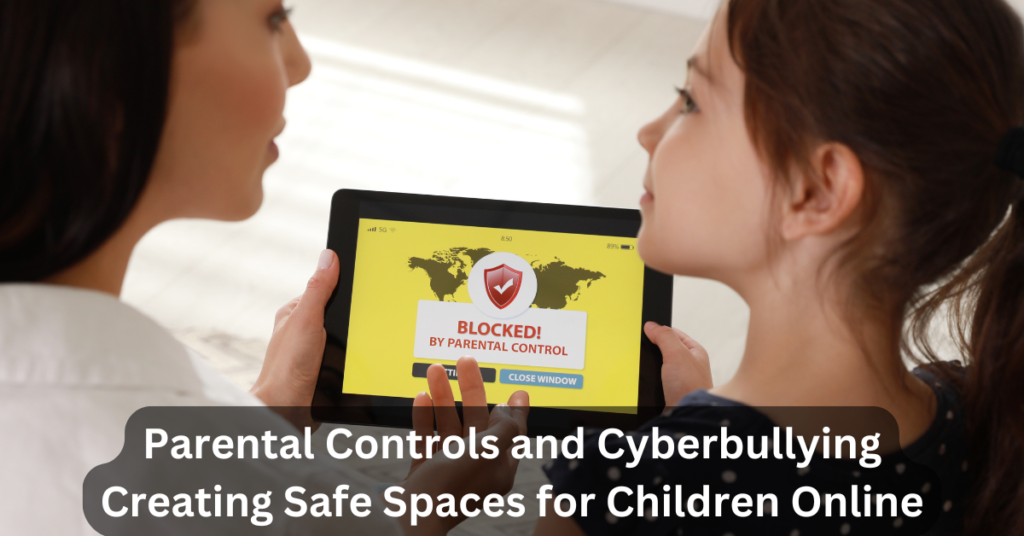Parental controls and cyberbullying prevention are key components in creating safe online spaces for children. The digital world offers many opportunities for learning and social connection but also exposes children to risks such as cyberbullying, inappropriate content, internet predators, and privacy breaches. Protecting children online involves a combination of proactive parenting, educating children about digital safety, and using technological tools like parental controls and monitoring apps.
Creating Safe Online Spaces with Parental Controls
Parental controls are software features and apps designed to help parents regulate and monitor their children’s digital activities. These tools can:
- Restrict access to specific websites, apps, or types of content that are inappropriate for children.
- Set time limits for device or internet use to manage screen time effectively.
- Monitor social media and messaging for signs of cyberbullying, explicit content, or other risks.
- Provide alerts to parents regarding suspicious or unsafe activity.
- Enforce safe search settings on search engines and social platforms.
Addressing Cyberbullying
Cyberbullying is harassment using electronic media like texts, social networks, or messaging apps and it is a pervasive risk for children online, affecting up to half of young internet users in some studies. Research shows that between 14.6% and 52.2% of children have experienced cyberbullying globally, and these incidents have increased significantly over recent years.
Effective strategies to combat cyberbullying include:
- Open communication: Encouraging children to talk about their online experiences without fear of punishment fosters trust and helps parents identify issues early. Conversations should cover respectful online behavior, digital empathy, and how to handle bullying incidents.
- Creating a non-judgmental environment: Parents should respond calmly and show interest in understanding their child’s digital interactions, enabling children to seek help when needed.
- Teaching digital citizenship: Helping kids understand how to behave kindly online, recognize bullying, and report or block bullies.
- Collaborating with schools: Schools can contribute by promoting safe environments and leading anti-bullying initiatives.
- Using monitoring tools cautiously: Monitoring apps and parental controls should be used transparently, respecting a child’s age and privacy while ensuring safety.
The Role of Spying Apps in Parental Controls
Spying apps, often marketed as parental control tools, play a controversial yet significant role in monitoring and protecting children in the digital space. These apps typically provide extensive surveillance features such as tracking location, reading text messages and call logs, monitoring social media activity, recording keystrokes, and sometimes remotely activating cameras or microphones.
Read About: Phone Tapping Techniques: How to Tap a Phone and Monitor Calls
Key Functions and Benefits:
- They offer real-time alerts about potentially harmful interactions, including cyberbullying or contact with strangers.
- Spying apps can help parents detect risky behaviors early, providing data to intervene before situations escalate.
- They allow parents to have comprehensive oversight of their child’s digital life, especially when children spend significant time online unsupervised.
Some popular parental control apps include:
- Bark: Uses AI to monitor texts, social media, images, videos, and audio for cyberbullying and explicit content; also supports location tracking.
- Aura Parental Controls: Sends alerts about online threats and lets parents set limits on apps and websites.
- Kaspersky Safe Kids: Offers GPS tracking, online filtering, and device battery monitoring.
These apps help parents not only block harmful content but also maintain an active role in their child’s digital life by receiving real-time notifications and reports for ongoing safety.
Read about: Android Hacking: Everything You Need to Know
Ethical and Practical Concerns:
- Such apps often raise serious privacy issues because they fundamentally involve invasive monitoring, which can violate a child’s right to digital privacy.
- Overuse or secretive use of spying apps can damage trust between parents and children, potentially pushing children to hide their online activities or find ways to circumvent controls.
- The data collected is sensitive and could be vulnerable to security breaches or misuse if the app is poorly designed or managed.
Effectiveness and Best Practices
Research indicates that while spying apps can increase parental awareness and reduce online risks, their effectiveness depends heavily on transparent use, age-appropriate monitoring, and open communication between parents and children.
- Experts advise parents to discuss openly with their children about what is being monitored and why, fostering a cooperative rather than secretive environment.
- Overly restrictive or covert surveillance may backfire by undermining digital trust and self-regulation skills in children.
- Parents are encouraged to balance technological monitoring with education on digital citizenship and respectful online behavior.
Spying apps can be a powerful tool to combat cyberbullying and keep children safe online, but their role should be carefully managed to respect privacy and promote healthy parent-child relationships. Transparency, ethical use, and complementing technology with education and communication are essential for their positive impact.
Supporting Safe Online Experiences
Beyond technology and monitoring, parents can create safe online environments by:
- Educating children early about online safety, privacy, and the risks of sharing personal information.
- Setting clear expectations about acceptable online behavior and boundaries.
- Using strong passwords and guiding children in managing their digital identities.
- Encouraging participation in child-friendly platforms and communities.
- Collaborating with educators and using resources such as conversation cards or contracts to facilitate ongoing dialogue about online experiences and cyberbullying.
Creating safe online spaces for children requires a multifaceted approach combining education, communication, active parenting, and technological tools like parental controls. While spying or monitoring apps can play a critical role in detecting cyberbullying and unsafe behavior, their use must be balanced with respect for children’s privacy and trust. Ultimately, fostering an open, supportive, and informed relationship with children enables them to navigate the digital world confidently and safely.

